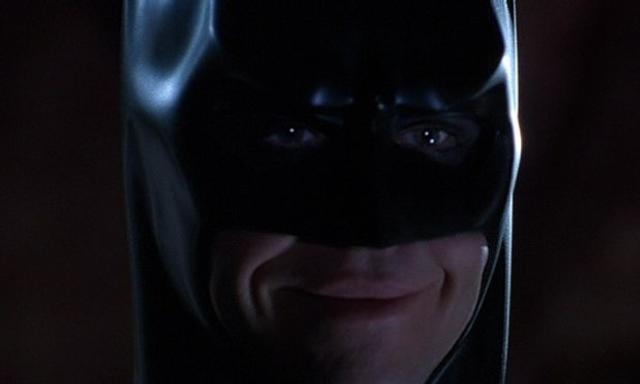In Defence Of... is a new series of articles where we'll step in and try defend - operative word is 'try' - films that have been unduly lambasted and unceremoniously dumped by critics and audiences alike. We've previously attempted to defend Con-Air (which some of you felt didn't need a defence) and The Phantom Menace (which a lot of you thought was completely indefensible). This week is Joel Schumacher's pop-rock opera-cum-superhero movie, Batman Forever, starring Val Kilmer, Chris O'Donnell and Jim Carrey.
We've previously opined about how Batman Forever - not Batman Returns - was the defining Batman film of the '90s, so if you've read that, you'll know we're prepared to defend this film until our dying breath. However, with the recent passing of Adam West, both Batman Forever and Batman & Robin deserve a reappraisal.
Let's be clear; Joel Schumacher knew exactly what he was doing when he began production on Forever - because he pretty much told us when we interviewed him a couple of months ago. In his own words, Forever was "younger and sexier and lighter," and it made up for the bleak psychodrama of Returns with all its overt sexual connotations. Schumacher moved Batman out of that S&M clad dungeon and into the bright, accessible world of '90s tentpole blockbusters - complete with one of the best soundtracks of the decade to boot.
When compared to Christopher Nolan, Zack Snyder or Tim Burton, Joel Schumacher and Batman Forever gets pasted with derisive comments about rubber nipples, the Bat Credit-Card (that was Batman & Robin, not Forever), and Jim Carrey and Tommy Lee Jones hamming it up as Riddler and Two-Face. Let's take the last part first, because this is something that just smacks of double standards. Jack Nicholson wore a f*cking purple suit and killed a guy with a quill in Batman '89. He even tried to mutilate Kim Basinger with a posey that shot out acid. Riddler and Two-Face, meanwhile, stole a lot of money and tried to brainwash the people of Gotham using TV - which is a brilliant, on-the-nose commentary on the vacuous nature of entertainment as a whole. It even played into the idea of wish fulfillment and the boundless optimism of '90s America under Bill Clinton - but no, Carrey and Lee Jones were playing it like cartoon characters.
You only need to look objectively at Forever to see where the film was taking its cues from; namely the '60s TV series with Adam West and Burt Ward. Like West, Kilmer was able to deliver the hokiest of lines with complete gravitas and without the tiniest shred of awareness. He believed everything he said, which is why Forever worked better and Batman & Robin didn't. With Batman & Robin, George Clooney knew that he was in a cartoon and he played it like that. It's not his fault, mind. According to on-set reports, Schumacher would shout over the loudspeaker before each take, "Remember, it's a cartoon! Action!" As well as the villains, the female lead - Nicole Kidman as Dr. Chase Meridian - was one of the few female characters in the series who had some kind of agency. She was a brilliant psychologist who rebuffs both Bruce Wayne and Batman, and while she may later fall into the damsel-in-distress routine, she's still involved in the story in a way that Kim Basinger's Vicki Vale wasn't.
It's a testament to just how resilient Batman is as a popular character that he can be reinvented and reimagined in different guises without it losing any of the meaning or value. He can be a hardened vigilante. He can be a damaged, wounded soul who is trapped by the past. And, yes, he can do the Batusi and talk about getting drive-through in the Batmobile. Batman Forever reminded us that Batman could be all of those things.


















































































